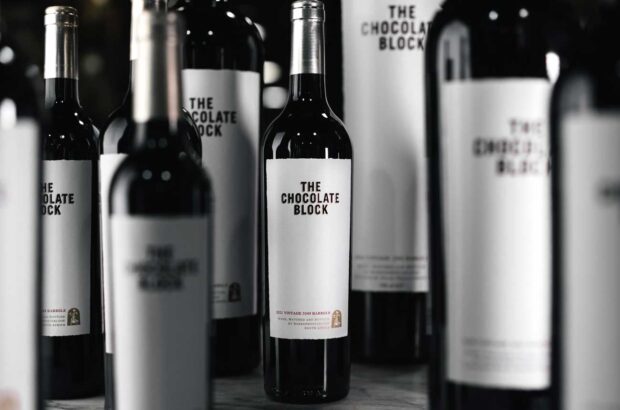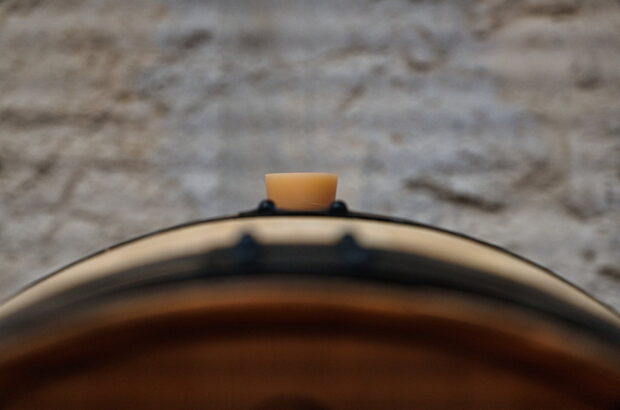From tiny hole-in-the-wall bars to lofty Michelin-starred restaurants, Spain’s gastronomic scene is more dynamic and vibrant than ever. The next generation of restaurateurs, chefs and sommeliers are crafting remarkable wine lists, innovative food-and-wine pairings and unique fusion cuisine. It’s impossible to list every exciting new venue in Spain, but the four restaurants and wine bars below are a snapshot of the people and places worth knowing about.
Albariza en las Venas
Calle Divina Pastora 3, Local 51, Jerez de la Frontera

The bar area at Albariza en las Venas, which opened in Jerez in May 2024. Credit: Abelvaldenebro
From the moment winemaker Juan Carlos Vidarte and sommelier Rocío Benito first met during the 2021 harvest at Bodegas Luis Pérez in Jerez, they knew they would work together again. Their latest collaboration is Albariza en las Venas, which opened its doors in May 2024. Named for Sherry country’s famous chalk soils, ‘Albariza in the Veins’ is much more than your average neighbourhood wine bar. ‘We wanted to open a place where our friends could come, and young people weren’t afraid to open a bottle – but also where winemakers in Cádiz could find wines from all over the world,’ Benito says.
There’s a spotlight on local wines. ‘Jerez is in a really great place right now,’ Benito continues. ‘There’s this explosion of new projects, with a lot of winemakers arriving in the area and young people investing in different styles like vinos de pasto [unfortified wines, firmly rooted in Jerez terroir]; we want to give them a platform.’
They also offer selections from countries such as Italy, Greece and Croatia, ‘which up until now were completely unknown here’.
Benito describes the bar as ‘a really casual space’, adding: ‘Both of us like to have fun with wine and we wanted the space to reflect that. The important thing is to have a great time drinking wine, without any pretence.’
Wines are complemented by gildas (skewered olive, anchovy and guindilla pepper), sandwiches and other tapas. A standout combination is the Ibérico pork jowl sandwich paired with a sparkling pét-nat Palomino, another style that has become a darling of Jerezano winemakers recently. Benito recommends Bodega de Forlong’s Burbuja (2021, US$26 PJ Wine), Bodega Vinifícate’s Sparkling Amorro (£23.50 Dvine Cellars) and El Piraña’s Tarbissana.
Okra
Rúa Luís Seoane 11, O Grove, Galicia

Okra: roasted onion, dashi broth and Iberian pork jowl
Having begun his career in his native Japan, Takahide ‘Taka’ Tanaka first worked with Javier Olleros when the latter was at the celebrated Michelin three-star Basque restaurant Martín Berasategui. When in 2009 Olleros opened his own restaurant, Culler de Pau, Taka spent years in the kitchen as Olleros’ right-hand man, together achieving two Michelin stars. Taka fell in love with O Grove – and with his now-wife Siana, when she arrived at Culler de Pau.
The couple opened Okra in May 2024, just after the birth of their son. ‘We opened Okra so we could all be together,’ Taka explains. The concept is a tavern with attentive service, impeccable food and an informal atmosphere. ‘We offer professional service, but at the same time we want to chat with our guests,’ Taka says.
Visitors can expect Japanese-inflected dishes using Galician ingredients, paired with European wines and Japanese sakes. ‘Very good wines have been made in Galicia for a long time, and now they’re being promoted more in restaurants,’ Taka says, ‘where people are introducing small wineries, native grapes and blends, and offering more daring by-the-glass listings. We want to take a bit of a risk.’
He says the menu changes often: ‘In the short time we’ve been open, we’ve already made quite a few dishes. But if I had to choose one I would say the miso-glazed dengaku aubergine paired with natural wine As Londras MC, a Mencía-based red blend with six months of carbonic maceration, made in Ribeira Sacra. And for the more daring, I would pair the scallop with vegetables in broth with Rihaku Wandering Poet sake.’
La Caníbal
Calle de Argumosa 28, Madrid

Javier Vázquez opened his wine bar in the Madrid neighbourhood of Lavapiés in 2018, to showcase his favourite wines, craft beers and artisan cheeses. He’s since added two sister venues: La Grifería in Madrid Río (just south of the river Manzanares), and the brewery and beer hall La Fábrica, which opened in late 2023, in the San Blas district.
La Caníbal has become a go-to destination for wine lovers. It’s an educational space, too, hosting regular classes and tastings with visiting winemakers. Visitors can enjoy 16 wines on tap or choose from a list of more than 800 Spanish and international labels. Head sommelier Pablo González says their ambition is ‘to promote sincere wines that represent a place, a vintage and a grower’.
There’s a similar approach in the kitchen, with a focus placed on seasonal ingredients from small, artisan producers. ‘Madrid’s gastronomic scene is dynamic and fun,’ González says. ‘Although it might sound a bit presumptuous, we feel that we’re forging a new path, aiming to democratise wine by pouring wines on tap and focusing on smaller winemakers over big, well-known brands.’
Although the wine list and menu change with the seasons, one star-pairing – matching octopus with the Mencía red on tap – has permanent pride of place, reflecting Vázquez’s Galician roots; the bar was going to be called ‘Galicia Caníbal’ after the 1986 hit by Galician pop-rock band Os Resentidos. González also recommends rice with lobster, ‘washed down with some of the small-producer Champagnes that we rotate’.
Mikan
Carrer d’Aribau 158, Barcelona

Mikan’s Dan Jin serving Iberian pork loin katsu. Credit: Anton Schaumann
Friends Dan Jin (known as Tan) and Arthur Holland-Michel started cooking and drinking together about five years ago.
Tan was born in China to a Korean family, and spent much of her life in Japan. ‘She would cook these delicious, soulful meals and I would bring over wines that I was learning about as I drank my way through the fundamentals of European natural wine,’ says Holland-Michel.
‘We realised that Tan’s food paired beautifully with the kinds of wines we were interested in, and thought others might enjoy the combination as much as we did.’
Together with a third partner, Woody Wang, they opened Mikan in April 2023. The space draws inspiration from Japanese wine bars, with a Spanish influence.
They serve small shared plates for dinner and a main dish with four sides for lunch. Holland-Michel describes the approach as ‘lighthearted but precise’, and says they don’t take themselves too seriously. They host a DJ event once a month.
Holland-Michel observes that Barcelona is going through a natural wine boom, but his approach is not dogmatic. ‘Every wine is on the list because we enjoy drinking it – nothing more, nothing less,’ he says.
‘We serve plenty of wines that cater to a more “classic” palate, but they’re not there as a concession. If we can see a way of making them work with the food, we’re delighted to have them.’
Some of the team’s favourite pairings include Iberian pork loin katsu with Didier Grappe’s Pif Purple from the Jura; koji-cured mackerel served with Cuvée Total, a rosé from Catalonian low-intervention producer Oriol Artigas (2020, £45 Dynamic Vines); or the house kimchi with a bottle of Kamara’s Nimbus Ritinitis, an orange retsina Assyrtiko from northern Greece near Thessaloniki.

Arthur Holland-Michel with wines from Jura producer Domaine de Cavarodes. Credit: Anton Schaumann












